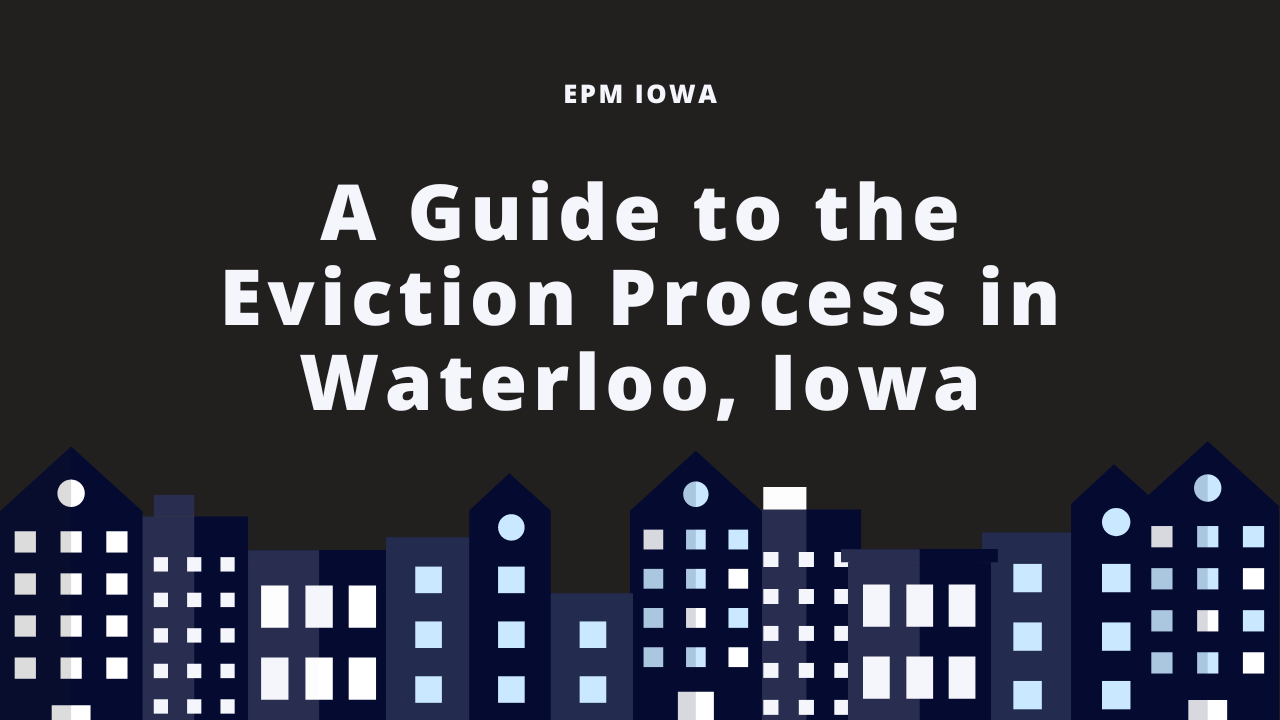
Chapter 562A of the Iowa Landlord and Tenant Law grants landlords the right to evict tenants if the reason is justifiable, such as nonpayment of rent.
When evicting a tenant, you must follow the state’s specific eviction process. It would be illegal for a landlord to take matters into their own hands and remove the tenant by their own means. Some examples of this would be shutting down their utilities, locking them out, or removing their belongings from the property.
As a landlord, the only way you can remove a tenant is through a court order. From start to finish, the entire process of obtaining the court order can take anywhere between 3 and 8 weeks. However, the process can take much longer if the tenant chooses to file an appeal.
In this article, we will outline this process for you from A-Z. Whether you are a DIY landlord or have been an owner for years, it’s vital to understand these laws and your responsibilities in them.
Notice to Quit
First of all, as mentioned above, you must first have legal grounds to begin an eviction process. Legal grounds include nonpayment of rent, rental agreement or lease violations, staying after the lease has ended, and illegal activity.
Even then, however, landlords must provide the tenant with written notice before terminating their tenancy. The notice period will depend on the situation.
To evict a tenant for nonpayment of rent you can serve them a 3-Day Notice to Pay or Quit. This will give the tenant a maximum of 3 days to pay rent due or leave. If the tenant does neither, you can proceed to court to file an eviction lawsuit.
To evict a tenant who has no lease or is on a month-to-month lease, you can serve them a 30-Day Notice to Quit. This will give the tenant a maximum of 30 days to move out. The amount of notice differs for tenants who don’t pay rent monthly.
For renters on a week-to-week lease, the notice amount is 10 days. The notice period for tenants paying rent on a quarter-to-quarter lease is 30 days. And for tenants on a year-to-year lease, the notice amount is 30 days.
To evict a tenant who commits a curable violation, landlords can serve them a 7-Day Notice to Cure or Vacate. This will give the tenant a maximum of 7 days to either fix the issue or move out. Examples of curable violations include: not keeping the property to the expected standards of cleanliness, or disturbing the peace and quiet of other renters.
If a tenant repeats a lease violation within a 6-month period, you can give them a 7-Day Notice to Quit. This will give them a maximum of 7 days to move out.
For renters who commit illegal activity, you must give them a 3-Day Notice to Quit. This will give the tenant a maximum of 3 days to move out.
Serving a Tenant With an Eviction Notice in Iowa
Iowa law also outlines the manner in which a landlord must serve an eviction notice to their tenants, including
Giving a copy to the tenant in person.
Leaving a copy of the eviction notice with anyone over the age of 18 in the absence of the tenant.
Posting a copy of the eviction notice in a conspicuous place as well as mailing another copy to the tenant via certified mail and first class mail.
Tenant Eviction Defenses in Iowa
Tenants have the right to file a written response after they are issued with a summons and complaint. The tenant can allege the following in order to delay or prevent their eviction.
The written notice was flawed. For example, it failed to mention the reason for the eviction.
The tenant complied with the eviction notice, for instance, by paying the due rent or curing a lease violation within the stipulated time.
The tenant stopped paying rent after the landlord failed to take care of important repairs. And the tenant had given the landlord proper notice regarding the repair.
The eviction was a way to retaliate against the tenant for exercising any of their legal rights.
The eviction was based on any of the tenant’s protected classes, such as race, color, religion, and sex.
The reason for the eviction was exaggerated.
As a landlord, you will want to ensure that none of the above applies to your situation. Make sure you have read all of the landlord-tenant laws and have a clear rental agreementso that you are fully prepared and can avoid any of these from happening.
Attending the Court Hearing
After the successful filing of a lawsuit, the court will issue a summons and complaint. Unlike an eviction notice, the summons and complaint will be served to the tenant by a process server.
The process server must serve the summons and complaint to the tenant in either of the following ways.
Through hand delivery.
Leaving a copy with another occupant who is at least 18 years old.
Post a copy in a conspicuous place on the property as well as mail another copy to the tenant via certified and first-class mail.
Leaving a copy with one of the tenant’s family members.
Leaving a copy with the rental unit’s owner or proprietor.
The copy must be served on the tenant at least 3 days before the date of the hearing.
Once the complaint is served, the eviction hearing must be held within 8 days. The only exception is if the landlord requests an extension. And even then, the hearing date will be 15 days at most from the date of filing.
In Iowa, tenants aren’t required to file a written response for them to attend the eviction hearing. But if the tenant fails to attend the hearing, the judicial officer will issue a default judgment favoring the landlord.
Writ of Execution
After a successful hearing, the court will issue a default judgment and you’ll be issued with a writ of execution.
This is the tenant’s final notice to pack all their belongings and leave. The writ gives the tenant a chance to move out with their belongings before the sheriff can forcefully evict them.
Bottom Line
As a landlord, it’s crucial that both you as the landlord and your tenants have a clear understanding of the eviction process in your state. We also recommend writing a clear rental agreement to avoid any potential issues.
With that said, it can be difficult to know all of the nuances and specifics of the eviction process. If you have any questions regarding any landlord-tenant laws, such as security deposits or breaking a lease, don’t hesitate to reach out to the property managers at EPM Iowa.
We have years of experience handling evictions for our clients and are experts in all Iowa rental laws. We also can tailor our services to meet any need you have. Our range of services includes property marketing, tenant screening, rental maintenance, tenant eviction, and more!
Disclaimer: This blog should not be used as a substitute for legal advice from a licensed attorney in your state. Laws change, and this post might not be updated at the time of your reading. Please contact us for any questions you have in regards to this content or any other aspect of your property management needs.




